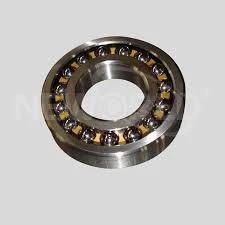
Dec . 05, 2024 14:34 Back to list
machinery bearings lubricants
The Importance of Lubricants in Machinery Bearings
In the realm of machinery, bearings serve a critical function in ensuring smooth operation and longevity of equipment. They reduce friction between moving parts, enabling machinery to operate efficiently. However, to achieve optimal performance, the role of lubricants in bearing systems cannot be overlooked. Lubricants vastly enhance the functionality of bearings and contribute to overall machinery health.
Understanding Bearings and Their Function
Bearings are mechanical components that allow for relative motion between parts, most commonly in rotational applications. They support loads, reduce friction, and help maintain precise alignment within machines. Common types of bearings include rolling bearings, sliding bearings, and plain bearings, each with a unique operational principle and application scope.
Despite their robust design, bearings are subject to wear and tear due to friction. This is where lubricants come into play. By reducing friction between contact surfaces, lubricants minimize heat generation, prolong the life of the bearings, and enhance the overall efficiency of the system.
The Role of Lubricants in Bear Mechanics
Lubricants provide a non-contact layer between the moving parts of a bearing. This separation is vital as it protects against direct metal-to-metal contact, which can lead to surface damage, increased wear, and ultimately, failure of the bearing. The main functions of lubricants in bearings include
1. Friction Reduction Lubricants create a film that allows for smoother movement between parts, which reduces the amount of energy lost to friction.
2. Temperature Control By dissipating heat generated from mechanical action, lubricants help to maintain optimal operating temperatures, preventing overheating that can lead to premature failure.
3. Wear Protection High-quality lubricants contain additives that form protective films on bearing surfaces, which help shield them from wear and corrosion.
4. Contaminant Suspension Lubricants can help keep contaminants, such as dirt and debris, suspended within the fluid, preventing them from damaging the bearing surfaces.
5. Shock Absorption Certain types of lubricants can absorb vibrations and shocks, providing additional support for the bearing.
Types of Lubricants Used in Bearings
machinery bearings lubricants

The selection of lubricants depends on various factors including the type of bearing, operating conditions, and the specific requirements of the machinery. The main types of lubricants include
1. Greases Typically used in rolling element bearings, greases are semi-solid lubricants that provide lasting protection. They stay in place longer than oils and are particularly beneficial in applications exposed to dust or contaminants.
2. Oils Liquid lubricants are ideal for high-speed applications as they can efficiently flow into tight spaces. Oils can be natural or synthetic and are often tailored with additives to enhance their performance.
3. Solid Lubricants In situations where liquid lubricants are not feasible (high temperatures or vacuum environments), solid lubricants like graphite or molybdenum disulfide can be employed. These provide excellent protection under extreme conditions.
Best Practices for Bearing Lubrication
To maximize bearing life and performance, certain best practices should be followed in lubrication
1. Regular Maintenance Scheduled inspections and re-lubrication should be conducted to ensure that the bearings are in optimal condition.
2. Correct Quantity Applying the right amount of lubricant is crucial; too much can lead to overheating, while too little can result in insufficient protection.
3. Contamination Control Keeping lubricants clean and preventing contamination is vital for effective lubrication.
4. Monitoring Employing condition monitoring tools can help detect early signs of bearing wear and the need for lubrication adjustments.
Conclusion
In summary, lubricants play an indispensable role in the operation of machinery bearings. They not only minimize friction and wear but also protect bearing surfaces from contaminants and excessive heat. Selecting the right type of lubricant and adhering to best practices in lubrication can lead to significantly improved performance and longevity of machinery. As industries continue to evolve and technologies advance, the development of innovative lubricants will play a crucial role in maintaining efficient and reliable machinery operations. The integration of quality lubricants into bearing systems is a key factor in ensuring the success and durability of mechanical systems across various applications.
Latest news
-
Grooved Ball Bearing Design and Functionality
NewsJun.04,2025
-
Concrete Mixer Bearing Load Capacity Testing
NewsJun.04,2025
-
6004 Bearing Dimensions in Robotic Joint Designs
NewsJun.04,2025
-
Advantages of Single-Row Deep Groove Ball Bearings
NewsJun.04,2025
-
Applications of Deep Groove Ball Bearings in Automotive Systems
NewsJun.04,2025
-
Innovations in Bearing Pressing Machine Design
NewsJun.04,2025
